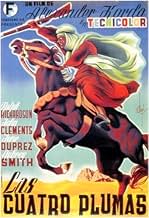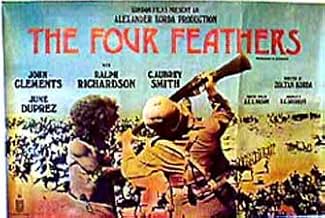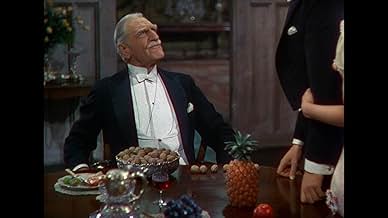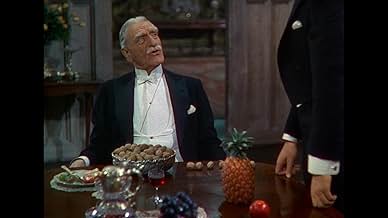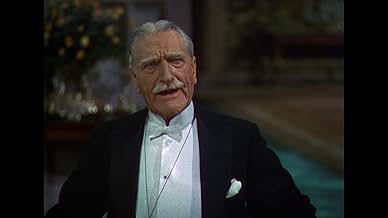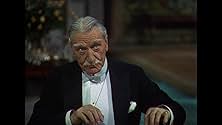Aggiungi una trama nella tua linguaA British Army officer resigns, burning his last-day summons to war in the Sudan. Accusing him of cowardice, his girlfriend and three friends give him white feathers. To gain redemption, he ... Leggi tuttoA British Army officer resigns, burning his last-day summons to war in the Sudan. Accusing him of cowardice, his girlfriend and three friends give him white feathers. To gain redemption, he shadows his friends to save their lives.A British Army officer resigns, burning his last-day summons to war in the Sudan. Accusing him of cowardice, his girlfriend and three friends give him white feathers. To gain redemption, he shadows his friends to save their lives.
- Regia
- Sceneggiatura
- Star
- Premi
- 1 vittoria e 2 candidature totali
- Man
- (non citato nei titoli originali)
Recensioni in evidenza
As in Stanley Baker's "ZULU" these giant black warriors are fearsomely portrayed with the scenes inside the primitive prison where the "dumb" spy Harry Faversham eventually finds himself are quite grim. And as another reviewer has commented, crusty Sir Aubrey as ever is the perfect & amusing retired tactician at the start & finish. A glare from under those bushy eyebrows was always enough! Great entertainment.
The film celebrates friendship and mutual obligation. It celebrates courage and determination. It celebrates a beautiful young couple and the love that conquers all, and celebrates the fact that the movies never let the funny-looking guy get the girl. It celebrates C. Aubrey Smith's eyebrows, and that's reason enough to watch any film.
The real heroes are Ralph Richardson, for acting at least 100% in every scene, never coasting or losing concentration for a minute, and the euphoniously named Osmond Borrodaile, whose second unit cinematography in faraway locations with monstrous cameras under difficult conditions enlivened many a movie.
But I'm not going to be internationalist about THE FOUR FEATHERS because this is a movie that makes you proud to be British , something that is sadly no longer allowed to happen these days . Perhaps the most stirring thing I can say about this movie is the way it wipes the floor with the contemporary competition that was coming out of Hollywood at the time . While the American studio were making similar monochrome movies with Errol Flynn and David Niven as the leads Ralph Richardson's performance alone is a reason to watch this movie and even if it wasn't there's still the story itself featuring themes like courage , honour , romance and redemption . You want battle scenes ? There's several in this movie as well choreographed as any thing seen in cinema at this time but perhaps the most what sets this British movie apart from other movies that were being produced across the pond is that it's a bit more gritty and sadistic than what Hollywood was producing . In one scene a British officer is flogged like a dog and he screams in pain as the camera pans on to the Mufti's face , a face lit up in sadistic glee , then the scene cross fades into a crowded dungeon where the prisoners are kept , a dark hell hole where the audience can actually taste the pain , fear and misery from the unfortunate prisoners . Even in those days Hollywood would pull their punches while a film like THE FOUR FEATHERSwould not
Sadly THE FOUR FEATHERS was released in 1939 which meant it qualified for the legendary Oscar ceremony the following year when GONE WITH THE WIND swept the board . A great pity because this very British movie deserved a hat full of awards . Sadly too Britain no longer has a film industry of its own and is reliant upon American finance , but perhaps the saddest thing is even if we did have a film industry no one in the business would want to film such an exciting historical epic in case they were labeled reactionary or racist
The Technicolor photography is eye-poppingly rich, at the same level as three other 1939 color classics—namely, Gone with the Wind, The Wizard of Oz and Drums Along the Mohawk. Particularly effective are the transitions from the browns and yellows of North African military outposts, with their punctuations by the red, white and blue of the Union Jack, to the deep greens of rural England. To top it off, much of the film was actually shot in the Sudan with what seems like thousands of native extras. By looks alone, sometimes it's hard to believe that this production predates the Second World War. It might have been a huge hit if it had had a Cary Grant or a Clark Cable or an Errol Flynn in the lead. As things go, John Clements is as good as can be, if not exactly bursting with charisma. Ralph Richardson gives a bravura performance as Clement's fellow officer, though he is saddled with a sequence that strains credulity beyond the breaking point. Let's just say that it takes a physically fit man longer than 30 seconds of direct exposure to the desert sun before he suffers total disorientation and unconsciousness. And if the sun can do that much damage so swiftly, then surely the flesh of the unconscious man's face, exposed for hours, would be cooked to a cinder.
C. Aubrey Smith plays his usual crusty old Brit, this time as a bombastic Crimean War veteran who complains that men are no longer men and war is no longer war. His repetitious boasting wears thin after a while. June Duprez barely registers as the female love interest.
Lo sapevi?
- QuizDirector Zoltan Korda's own remake of this film, Tempesta sul Nilo (1955), re-used a lot of the battle sequences from this movie, which did not lend themselves very well to the cropping necessary to achieve the width of the CinemaScope ratio, nor did their comparative fuzziness blend well with the new footage.
- BlooperWhen Capt. Durrance feels the face and head of the dead soldier outside his tent, the corpse moves his head, lifting and turning it.
- Citazioni
Harry Faversham: In England, the white feather is the mark of a coward.
Dr. Harraz: Ah, I see. Then why worry? Be a coward and be happy.
Harry Faversham: No, Doctor. I have been a coward, and I wasn't happy.
- Curiosità sui creditiOpening credits prologue: In 1885 the rebellious army of cruel dervishes enslaved and killed many thousands of defenceless natives in the Sudan, then laid siege to Khartoum. The scanty garrison's heroic commander, General Gordon appealed for help from England - but no help reached him.
- ConnessioniEdited into Tempesta sul Nilo (1955)
- Colonne sonoreAuld Lang Syne
(1788) (uncredited)
Lyrics by Robert Burns, music traditional
Heard during the departure of the Regiment
I più visti
Dettagli
- Tempo di esecuzione2 ore 9 minuti
- Proporzioni
- 1.37 : 1
Contribuisci a questa pagina



